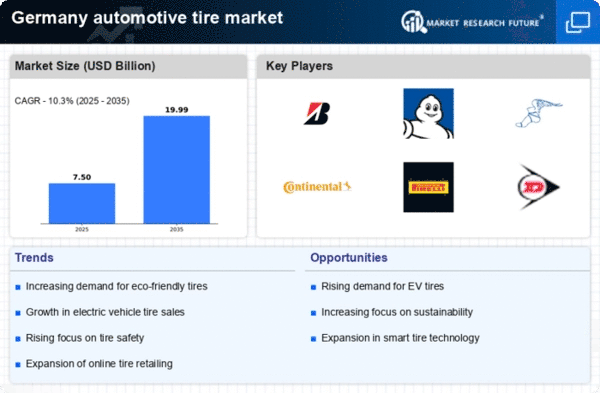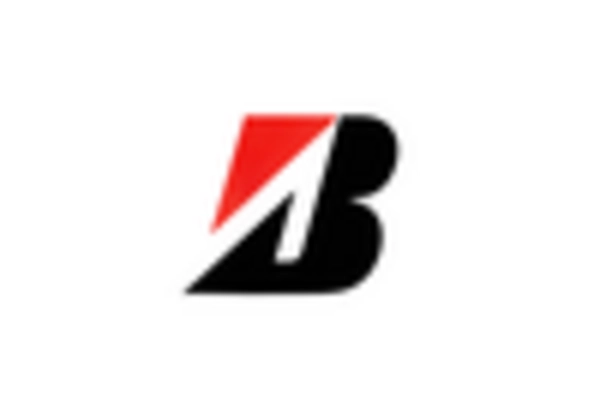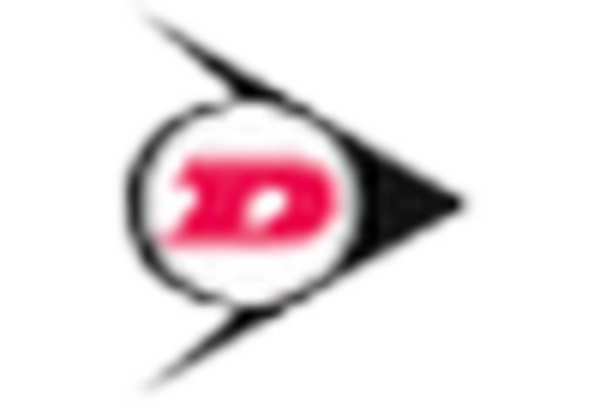Growth of E-Commerce in Tire Sales
The automotive tire market in Germany is witnessing a transformative shift due to the rapid growth of e-commerce platforms for tire sales. Consumers are increasingly opting to purchase tires online, attracted by the convenience and competitive pricing offered by various e-commerce retailers. In 2025, online sales are projected to represent approximately 25% of total tire sales in the automotive tire market. This trend is further fueled by advancements in digital marketing and the proliferation of mobile applications that facilitate easy access to tire information and purchasing options. As a result, traditional brick-and-mortar retailers are compelled to adapt their business models to remain competitive. The automotive tire market is thus evolving, with a greater emphasis on online presence and customer engagement strategies.
Rising Awareness of Tire Maintenance
The automotive tire market in Germany is experiencing a heightened awareness of tire maintenance among consumers, which is influencing purchasing behavior. Educational campaigns and initiatives by tire manufacturers and automotive organizations are emphasizing the importance of regular tire checks, rotations, and proper inflation. This awareness is likely to lead to increased demand for premium tires that offer better longevity and performance. In 2025, it is anticipated that the market for maintenance-related tire products and services could grow by approximately 20%, reflecting a shift towards proactive tire care. Consequently, the automotive tire market is adapting to this trend by offering products that not only meet performance standards but also promote longevity and safety, thereby enhancing overall consumer satisfaction.
Regulatory Compliance and Safety Standards
The automotive tire market in Germany is significantly influenced by stringent regulatory compliance and safety standards imposed by governmental authorities. These regulations mandate that tires meet specific performance criteria, including wet grip, rolling resistance, and noise levels. As a result, manufacturers are investing heavily in research and development to ensure their products comply with these regulations. In 2025, it is estimated that compliance-related costs could account for up to 15% of total production expenses in the automotive tire market. This focus on safety not only enhances consumer confidence but also drives innovation, as companies strive to develop tires that not only meet but exceed regulatory requirements. Thus, the automotive tire market is likely to see a continuous evolution in tire design and technology to align with these safety standards.
Increasing Demand for High-Performance Tires
The automotive tire market in Germany experiences a notable surge in demand for high-performance tires, driven by the growing popularity of sports and luxury vehicles. As consumers increasingly prioritize performance attributes such as grip, handling, and durability, manufacturers are compelled to innovate and enhance their product offerings. In 2025, the high-performance tire segment is projected to account for approximately 30% of the total market share, reflecting a shift in consumer preferences. This trend is further supported by advancements in tire technology, which enable the production of tires that can withstand higher speeds and provide better traction. Consequently, the automotive tire market is adapting to meet these evolving consumer expectations, leading to increased competition among manufacturers to deliver superior products.
Technological Advancements in Tire Manufacturing
The automotive tire market in Germany is significantly impacted by technological advancements in tire manufacturing processes. Innovations such as 3D printing, advanced materials, and automated production techniques are revolutionizing how tires are designed and produced. These advancements enable manufacturers to create tires that are lighter, more durable, and environmentally friendly. In 2025, it is projected that the adoption of advanced manufacturing technologies could reduce production costs by up to 10%, thereby enhancing profitability within the automotive tire market. Furthermore, these technologies facilitate rapid prototyping and customization, allowing manufacturers to respond swiftly to changing consumer demands. As a result, the automotive tire market is likely to see a continuous influx of innovative products that cater to diverse consumer needs.
















